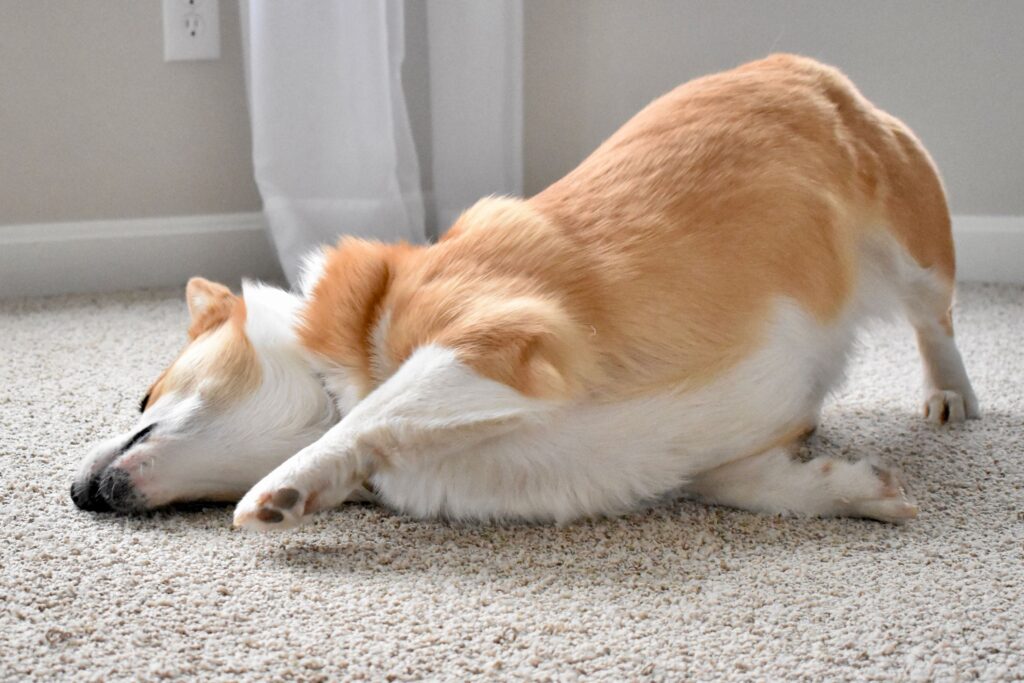If your cat is peeing on the stove, it may be due to territorial marking or a medical issue. To address this behavior, clean the area thoroughly, provide litter box options, and consult a veterinarian to rule out any underlying health problems.
Proper understanding and intervention can help resolve this situation and ensure a clean and healthy environment for both you and your cat.
Contents
- 1 Reasons For This Unusual Behavior
- 2 Identifying The Underlying Cause
- 3 Creating A Cat-friendly Environment
- 4 Addressing Stress And Anxiety
- 5 Recognizing Medical Signs
- 6 Diagnostic Process
- 7 Veterinary Treatment Options
- 8 Frequently Asked Questions For Why Is Your Cat Peeing On The Stove And What To Do About It?
- 9 Conclusion
Reasons For This Unusual Behavior
One of the common and frustrating problems cat owners face is when their cat starts peeing on the stove. This unusual behavior can be caused by various reasons.
| Marking Territory: | Cats are territorial animals, and they have a natural instinct to mark their territory. Sometimes, they may consider the stove as part of their territory and urinate on it to leave their scent and establish dominance. |
| Stress or Anxiety: | Cats can get stressed or anxious due to various factors such as changes in the environment, introduction of new pets, or even loud noises. Stress can cause them to exhibit unusual behaviors like peeing on the stove. |
| Medical Issues: | In some cases, peeing on the stove can be a sign of underlying medical issues. These may include urinary tract infections, bladder stones, or even kidney disease. It is important to rule out any medical problems by taking your cat to the veterinarian. |
If your cat is peeing on the stove, it is crucial to address the root cause of the behavior. Providing a designated litter box, ensuring a stress-free environment, and seeking veterinary advice can help resolve this issue and maintain a harmonious living space with your feline companion.
Identifying The Underlying Cause
Observation and analysis play a crucial role in understanding why your cat is peeing on the stove. Start by observing their behavior closely and take note of any changes in their routine or environment. Look out for signs of stress, anxiety, or territorial marking, as these could be potential triggers. Keep in mind that medical issues like urinary tract infections or bladder stones can also lead to inappropriate elimination.
If you suspect a medical issue or if the behavior continues despite your efforts, it is important to consult a veterinarian. They can rule out any underlying health problems and provide guidance on how to address the issue. Your vet may suggest behavioral modifications, environmental enrichment, or medication if necessary. Additionally, they can offer valuable advice on litter box placement, cleanliness, and type of litter to use.
Creating A Cat-friendly Environment
Providing Sufficient Litter Boxes: Cats need multiple litter boxes to feel comfortable and avoid marking their territory elsewhere. For a household with one cat, it is recommended to have at least two litter boxes. Ensuring Proper Litter Box Placement: Place the litter boxes in quiet and accessible areas where your cat feels safe. Avoid placing them near loud appliances, high-traffic areas, or close to where your cat eats or sleeps. Cats prefer privacy when using their litter boxes.
Using Positive Reinforcement Techniques: When your cat uses the litter box appropriately, reward them with praise, treats, or playtime. This will reinforce the desired behavior and encourage them to continue using the litter box. On the contrary, avoid using punishment or negative reinforcement as this may create stress and anxiety, making the problem worse.
Addressing Stress And Anxiety
A common reason why cats may urinate outside of their litter box is due to stress and anxiety. To tackle this issue, it is important to establish a consistent routine for your feline friend. Cats thrive on predictability, so feeding, playtime, and litter box cleaning should occur at regular intervals. This helps create a sense of security and stability for your cat.
In addition to a routine, offering enrichment activities can help alleviate stress. Providing scratching posts, toys, and interactive playtime not only keep your cat engaged but also divert their attention away from anxiety-inducing factors.
| The Role of Pheromone Sprays |
|---|
| Pheromone sprays, such as Feliway, can be effective in reducing stress. These sprays mimic the natural feline facial pheromones, creating a calming effect. By spraying them on the stove or around the areas where your cat has been urinating, you can help to discourage the behavior and promote a more relaxed atmosphere. |
Remember, it’s important to consult with a veterinarian to rule out any underlying medical conditions that could be contributing to your cat’s inappropriate urination. With patience, consistency, and by addressing the root causes of stress, you can help your furry friend overcome this behavioral issue.
Recognizing Medical Signs
Frequent Urination: If your cat is frequently urinating in unusual places like the stove, it may be a sign of a medical issue. Cats with urinary tract infections or bladder stones often experience increased urgency to urinate. Keep an eye out for your cat using the litter box more frequently or straining to urinate.
Blood in Urine: The presence of blood in your cat’s urine is a concerning sign. It can indicate a variety of conditions including urinary tract infections, bladder stones, or even more serious problems like kidney disease or cancer. If you notice blood in your cat’s urine, it’s crucial to seek veterinary attention promptly.
Painful Urination: Cats experiencing pain while urinating may associate the litter box with discomfort and avoid using it. This can lead to inappropriate elimination in other areas, such as the stove. Watch for signs like vocalization, excessive licking of the urinary area, or straining to urinate.
Diagnostic Process
During the diagnostic process for determining why your cat is peeing on the stove, a veterinary examination is an important step. This examination typically includes several key components, such as urinalysis and blood tests.
Urinalysis involves analyzing a sample of your cat’s urine to check for any abnormalities such as signs of infection or urinary tract disease. Blood tests, on the other hand, can provide valuable information about your cat’s overall health and help identify any underlying medical conditions that may be contributing to the behavior.
By conducting these tests, your veterinarian can gather important data to assist in diagnosing the cause of your cat’s inappropriate urination. This information will then guide the appropriate treatment plan to address the issue and hopefully resolve the problem entirely.
Veterinary Treatment Options
When it comes to dealing with a cat peeing on the stove, veterinary treatment options can be considered. Medications may be prescribed by the veterinarian based on the underlying cause of the behavior. Dietary changes may also play a role in resolving the issue, as certain foods can affect urinary health. Environmental modifications can be implemented to help deter the cat from using the stove as a pee spot. This can include providing multiple litter boxes in accessible locations, ensuring they are clean and inviting, and using pheromone sprays or diffusers to create a calming environment. Cat owners should also ensure that their feline companions have sufficient outlets for play and exercise to reduce stress levels. It is important to consult with a veterinarian to determine the best course of action to address the issue of a cat peeing on the stove.

Credit: www.reddit.com
Frequently Asked Questions For Why Is Your Cat Peeing On The Stove And What To Do About It?
Why Is My Cat Peeing In The Kitchen?
Cats may pee in the kitchen due to territorial marking, stress, or a medical issue. Ensure the litter box is clean and accessible, provide multiple boxes if necessary, and make sure your cat feels secure. If the problem persists, consult a veterinarian to rule out any underlying health concerns.
Why Did My Cat Pee On The Kitchen Floor?
Cats may pee on the kitchen floor due to various reasons like medical issues, stress, or territorial marking.
Why Does My Cat Pee On Appliances?
Cats may pee on appliances due to territorial marking or stress. Providing multiple litter boxes, keeping them clean, and reducing stressors can help.
How Do You Clean Cat That Peed On Itself?
To clean a cat that has peed on itself, gently wipe the affected area with a damp cloth or a pet-safe wet wipe. Use a cat-friendly shampoo to wash the soiled fur, and rinse thoroughly. Dry the cat using a towel or a low-heat blow dryer.
Conclusion
To sum up, understanding why your cat is peeing on the stove is crucial to finding a solution. By addressing potential medical issues, providing enough litter boxes, and implementing behavior modification techniques, you can prevent this unwanted behavior and create a litter box-friendly environment.
Remember, consistency and patience are key in resolving this issue and maintaining a clean and happy home for both you and your furry friend.
Katie Lindsey is a passionate cat lover and founder of Cats Solution, a comprehensive resource for all things feline. With a lifelong love for cats and extensive knowledge in their care and behavior, she provides expert advice and solutions to cat owners. Through her website, Katie fosters a supportive community where cat enthusiasts can find guidance and heartwarming stories. A dedicated advocate for animal welfare, Katie also promotes responsible pet ownership and adoption. Join her on this purr-fect journey celebrating the joy of feline companionship.



